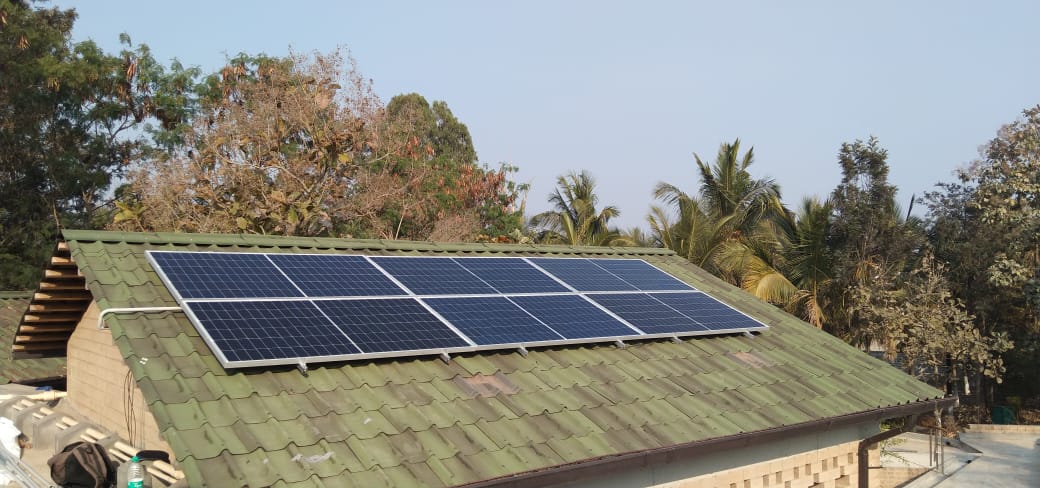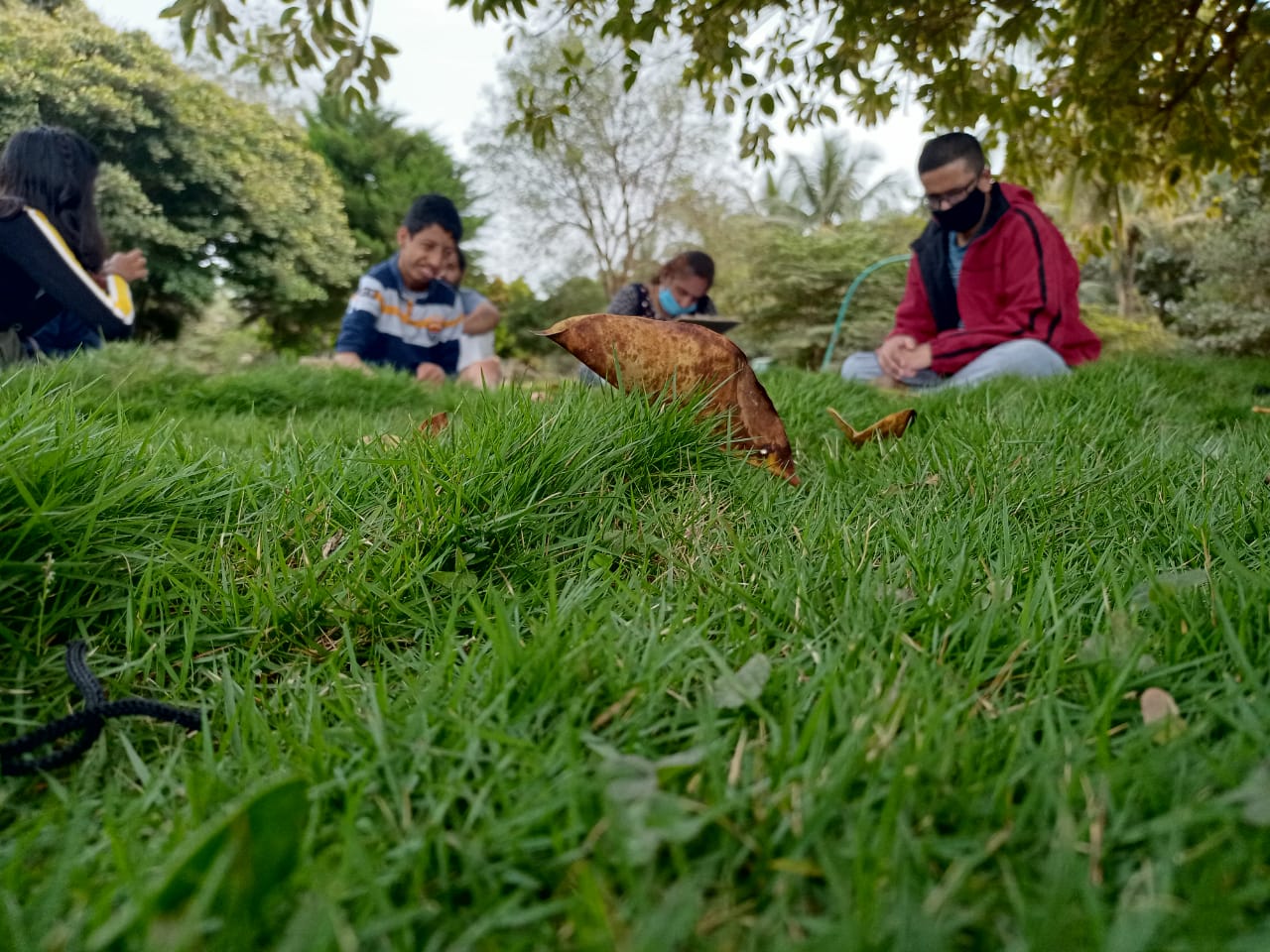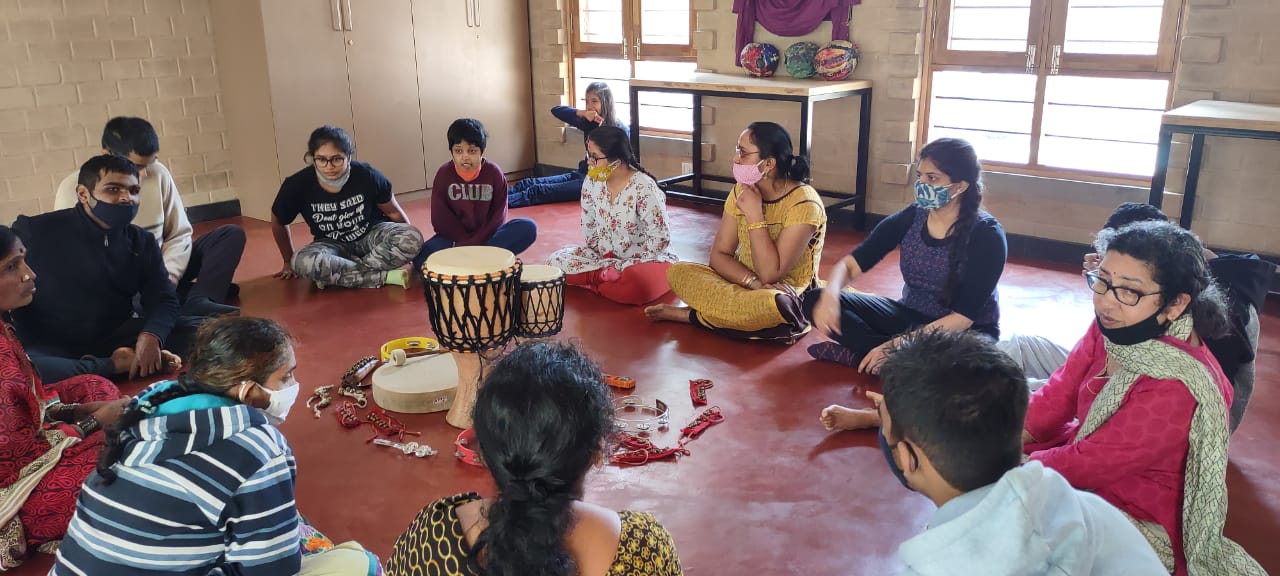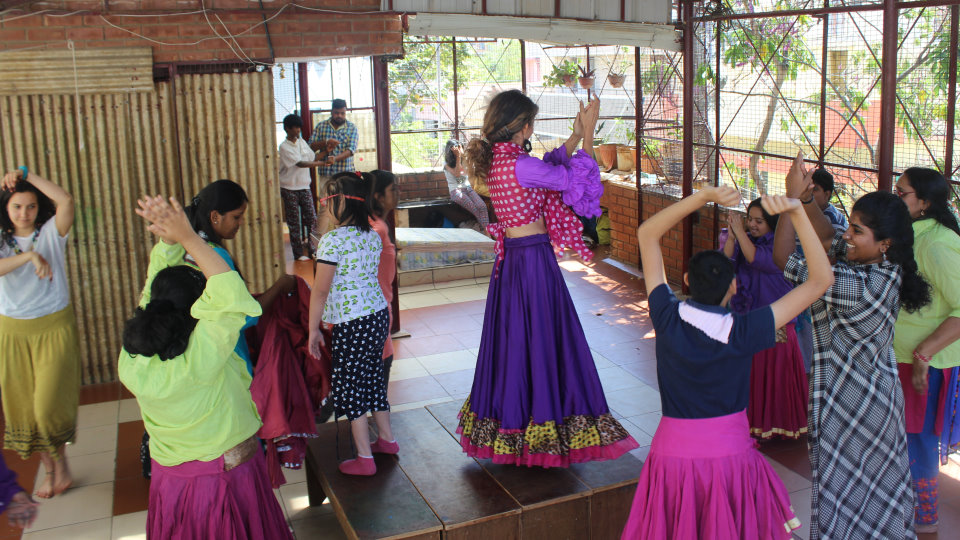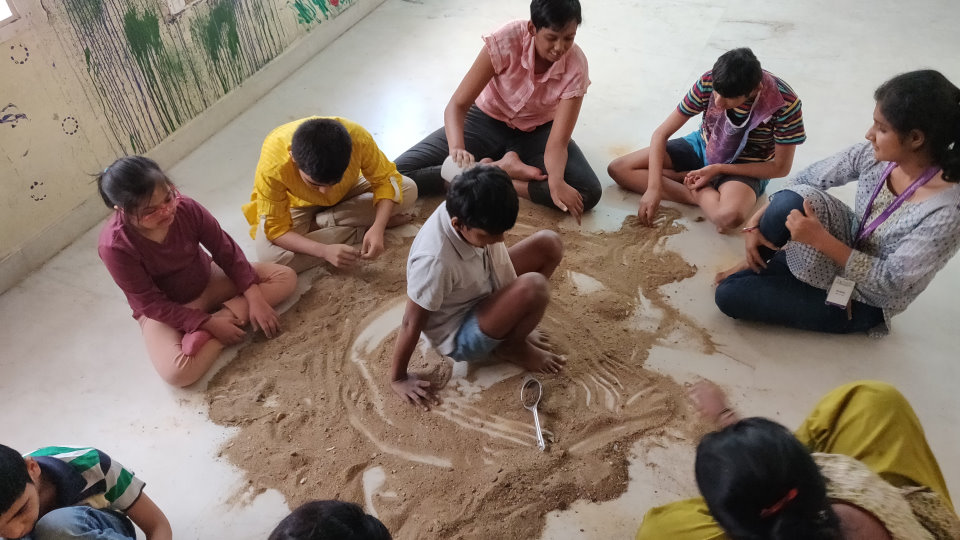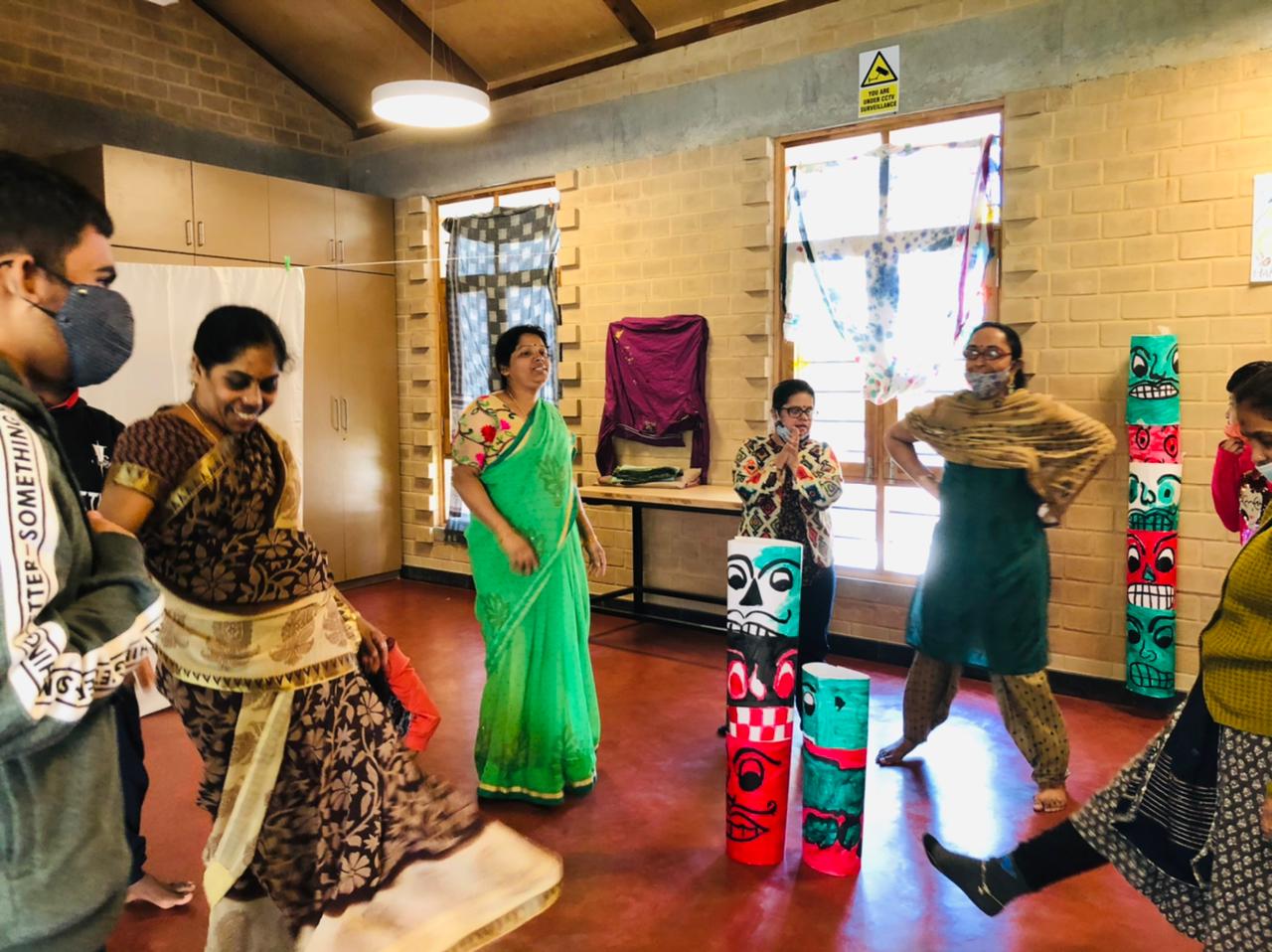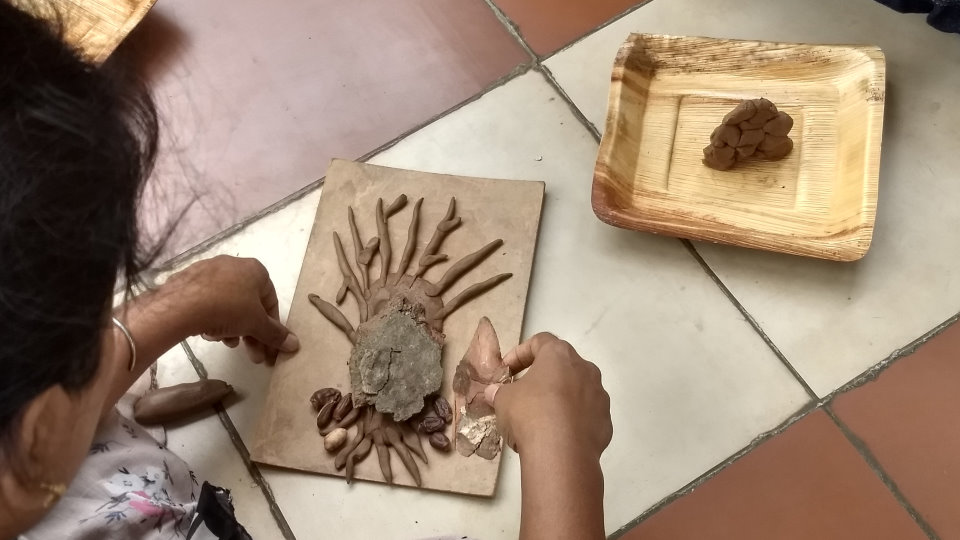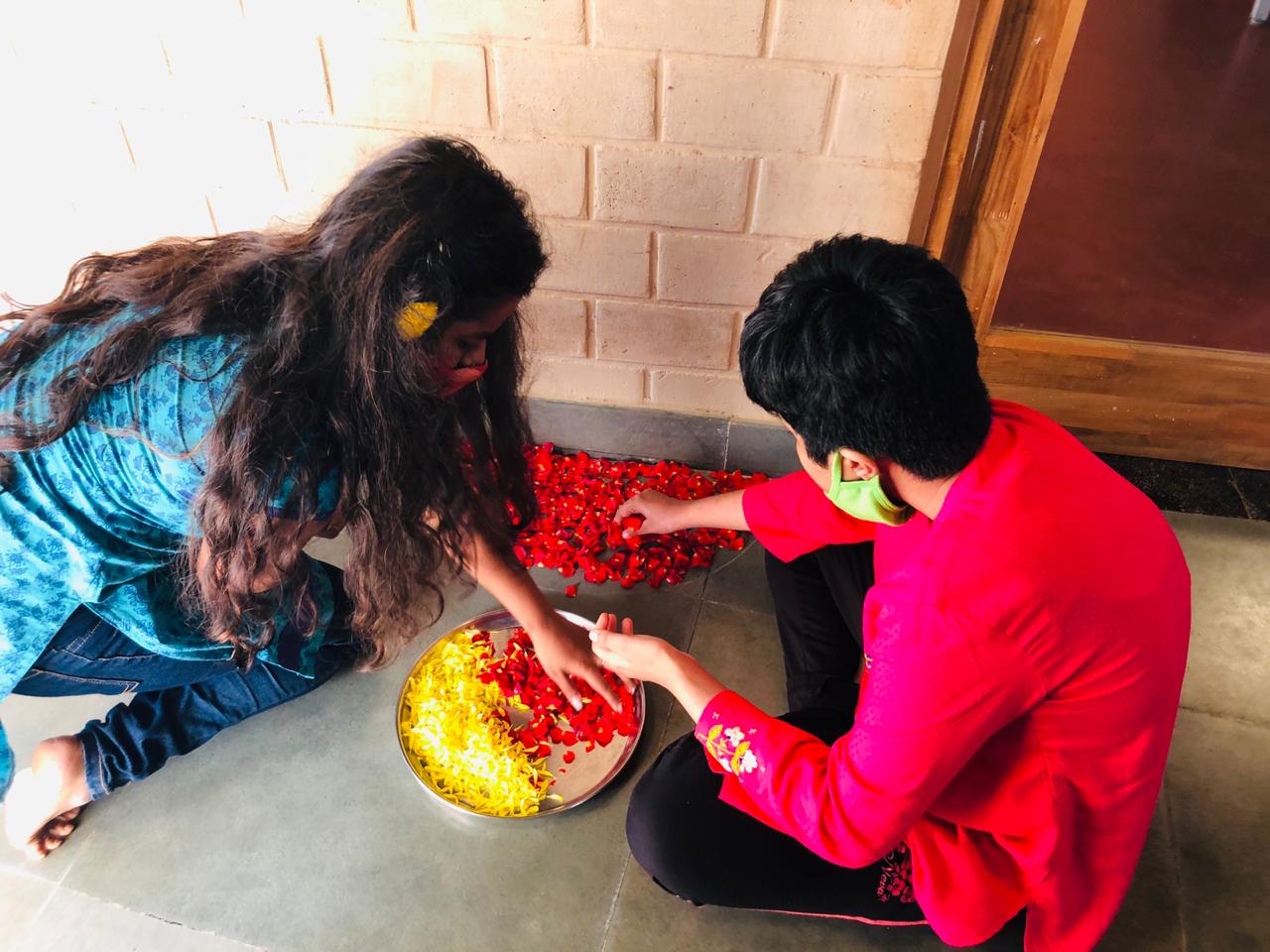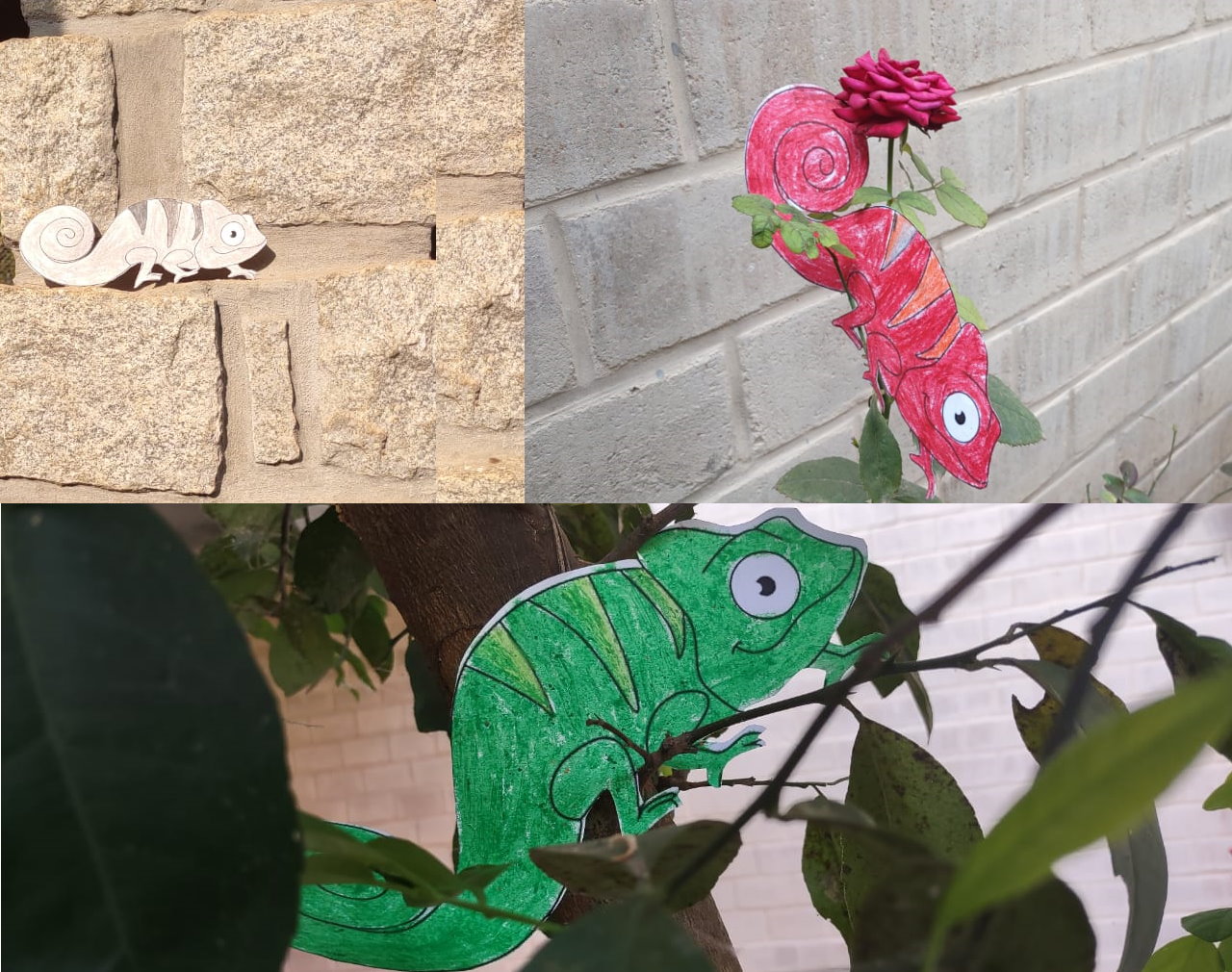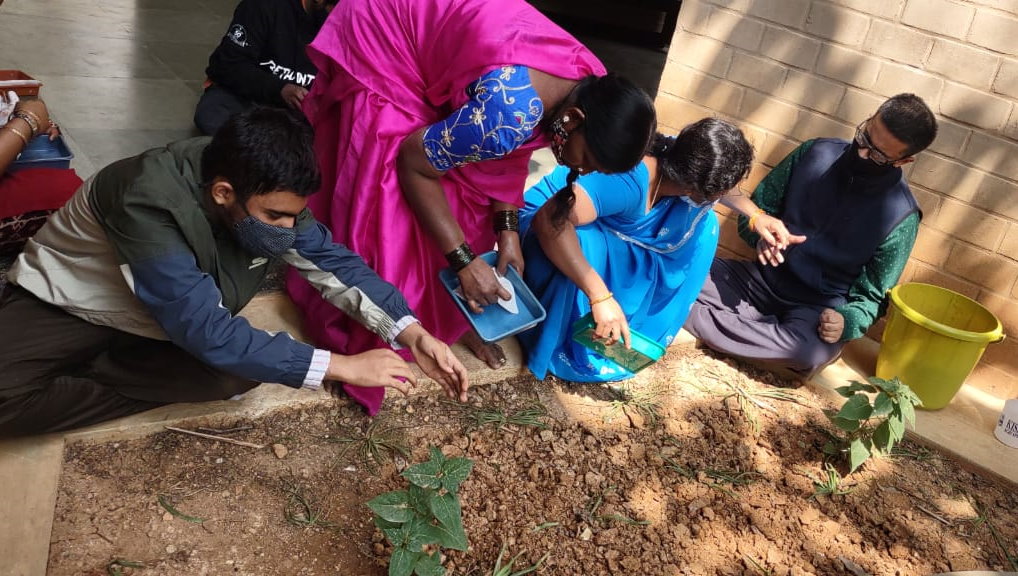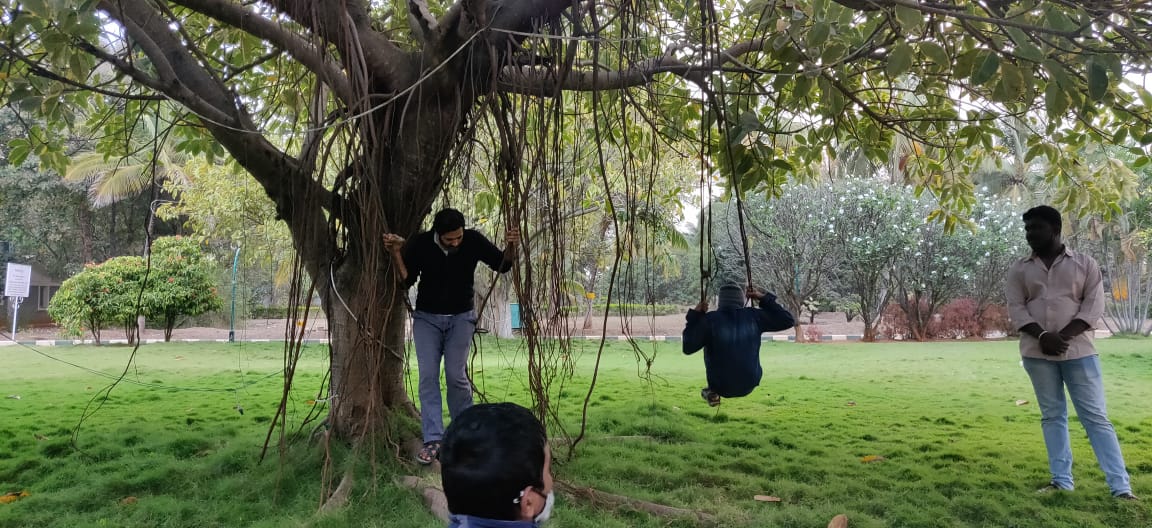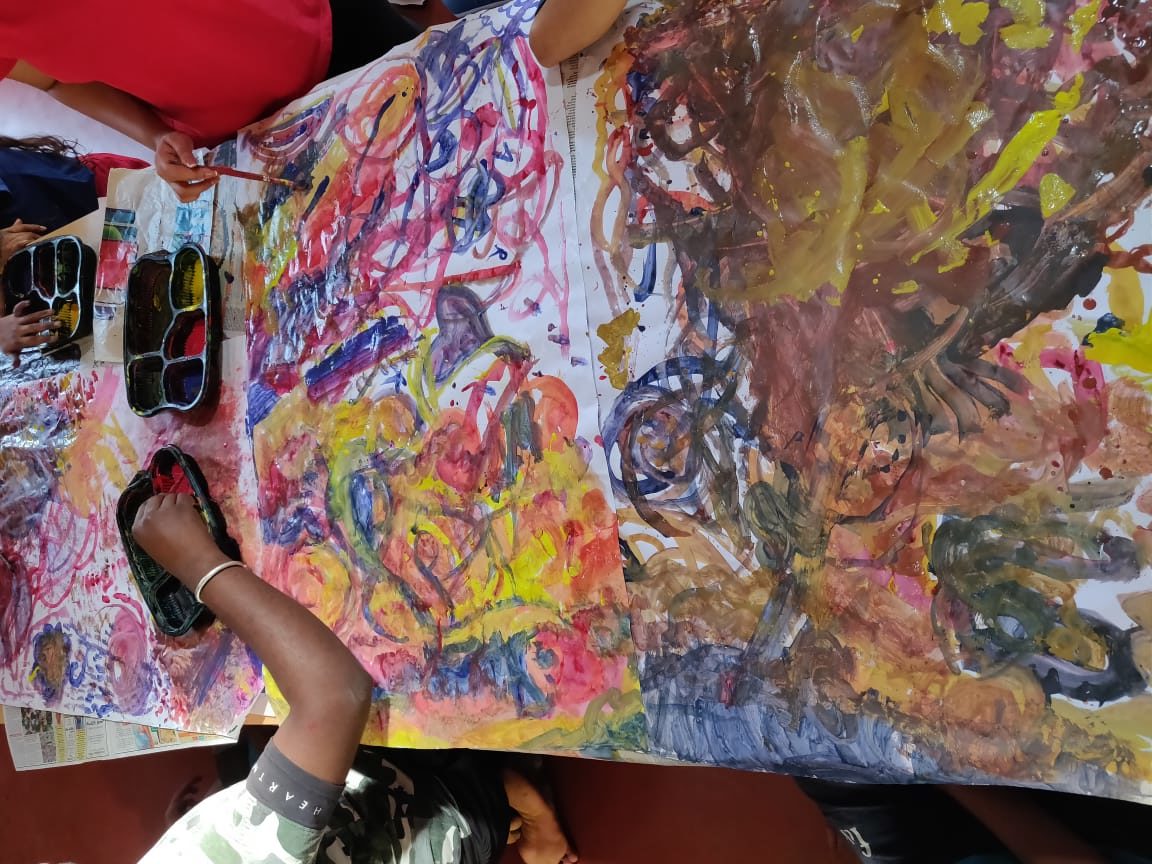Uhuru
Uhuru’s curriculum design is geared towards enabling children to acquire the tools needed to navigate the daily practicalities of life while also preparing to deal with some of the larger questions that life asks every child and adult.
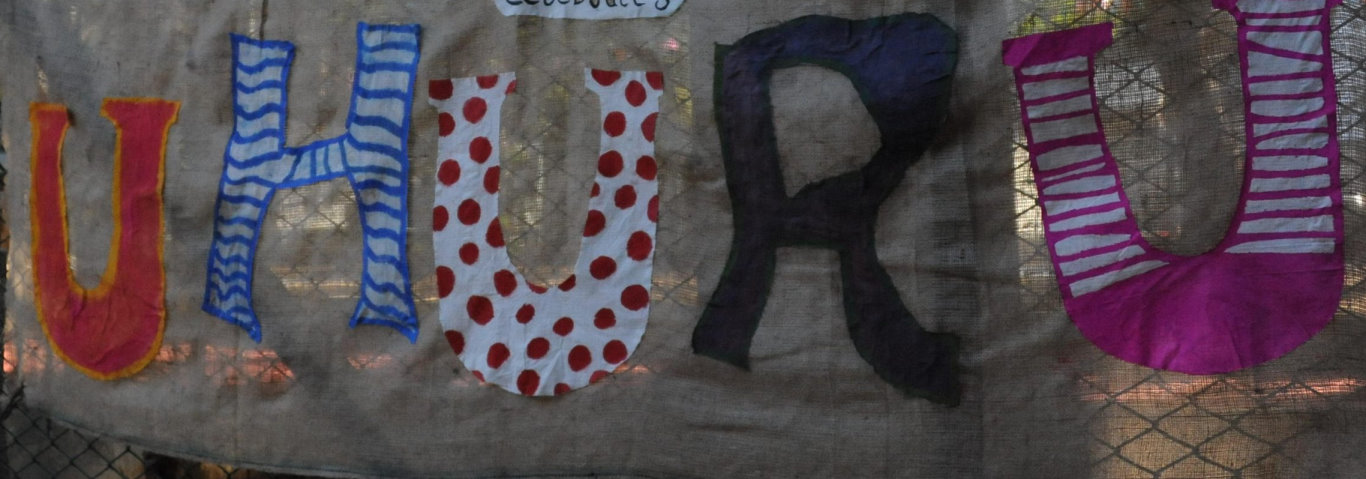
Introduction
The Uhuru programme is the bedrock of our Direct Beneficiary programme. Held at our lush Nelamangala Campus, it consists of learning and growing through a semi-residential programme from Monday to Thursday, along with a day boarding format.
Here, learning is embodied for the children and their families through many experiences provided by a range of facilitators, ABT and API practitioners, external faculty, visiting artists, peers, interns and volunteers.
Along with meeting the learning outcomes, our semi-residential facility works as a service delivery model that looks at the mental health and well-being of the not just the children but that of their families and the caregivers, the communities in the neighbouring village and schools.
Why do we need Uhuru ?
“Uhuru” in Swahili, Arabic, Urdu, Turkish and some similar languages, stands for “freedom”. As the name suggests, the Snehadhara Foundation’s vision for its children and adults with special needs is nothing short of uhuru.
Their special needs notwithstanding, we believe that the needs and preferences of those with disabilities should be at the centre of their learning trajectories, defining the services and support they wish to receive from their surrounding communities. These preferences and needs drive the system of services and supports that enable them to live the lives they truly wish to live.
Our focus is on creating a space where compassion is an integral part of daily living—with respect to the self and with others; resilience is built to deal with all that comes in the path; attention and observation skills are honed; emotions are acknowledged and negotiated; learning flows from connection with each other and an understanding of the larger interconnectedness of all where everything emerges naturally.
The children stay here without their parents, under the care of an extensive, expert team of caregivers. They gradually learn to do things more independently, all the while under the caring gaze of supervisors and practitioners.
The Story of Uhuru
Snehadhara Foundation’s Uhuru programme at the centre of the first episode of Stories of Change, a radio programme by Azim Premji University. Broadcasted on radio and uploaded on the YouTube, this story is a celebration of the Uhuru programme that has continuously aimed to creative wholesome, inclusive and joyful learning experiences for all.
Intent of on-Campus Learning
- Activities of Daily Living (ADL) are no longer merely sessions but a way of life on Campus, as our happy campers grow into a cohesive community and understand their restructured relationships from a family and social perspective.
- Independence in terms of thought, deed and expression is our aspiration and goal, while the children will be facilitated to function at ease in all given circumstances.
- Reassurance for parents as they find more time for self-care, secure in the knowledge that their children are experiencing greater autonomy and space for growth in a safe and monitored environment.
- Me-myself time for the children will be spread across the day to not just include serenity in solitude but also to occupy oneself, meaningfully and productively. Our children will be invited to focus on developing hobbies and getting oneself involved in interactions and activities “at (their new) home,” based on individual interest.
Curriculum 2024-25
Snehadhara Foundation (SF) has developed the multi-arts based Uhuru Campus Programme curriculum based on its engagement with diverse demographics, conducting action research on learning, and collaborating with professionals from various fields. At its core, this curriculum embodies the belief that every child, regardless of their physical or mental abilities, deserves a meaningful lifelong learning journey within a supportive community environment. ‘Continuous learning’ is a central philosophy based on the idea that learning is a learner-led process in a safe and loving environment.
The group and one-on-one sessions on campus use Arts-based practices to reach the desired goals with children. The programme includes touching upon multiple topics under Sciences, Social Sciences, Literacy and Numeracy through the Home Sciences. The curriculum is the broad framework of what is covered. These topics are used as an anchor to build on the goals of Cognitive, Body, Language and Social Domains. Each of these topics are covered through different forms of arts including visual arts, music, movement, drama and play amongst others. The programme will be progressive in nature, delving into different areas and stages of learning, while setting appropriate goals for the child and the group to achieve based on their abilities at the beginning of the session. Each session will be modified based on the observations of the previous session and the needs of the group. Building a sense of social identity and belonging through community living, and building independence and self-reliance through activities of daily living are the key identifying features of the programme.
The curriculum leverages home science concepts to tailor a learning curriculum for this particular group and context. By incorporating home science concepts into their daily routines, the primary focus is to empower children with the skills and knowledge necessary to foster independence, heighten awareness about their surroundings, and provide meaningful real-life experiences. Focus areas include Daily Living Skills, Nutrition and Meal Preparation, Home Management, Family and Relations, Safety and Hygiene, amongst others.
A glimpse of our sessions in Uhuru
Life on Campus — The Individual and the Community
Akin to a village raising a child, it takes each of us within our SF community to work together to create a holistic and symbiotic space of shared experiences and co-existence. Each one on Campus is exposed to a wealth of experiences, a great many of them being linked to working together and creating inclusive circles which in themselves help create a therapeutic relationship.
Along with meeting their learning and therapeutic goals through Arts Practices, the children engage with cooking, meal preparations, cleaning, nature walks and observation, caring for things and for each other. They learn the fundamentals of expressive and receptive language through an exposure to Tamil, Hindi, Kannada, Telugu and English.
Simultaneously, the one-on-one sessions with the children focus on their skills in terms of their individual physical, social, emotional, and cognitive needs. Each child works with one project each term.
We have also chalked out how the children and the support team can spend quality time together on activities outside the classroom: Through making wholesome and delicious masalas or pickles that go into the meals that we cook together; through providing immense nourishment, love and care into growing a variety of plants and vegetables on Campus such as bottle gourds and air potatoes.
The semi-residential format (Monday-Thursday) encourages the children to build their independence with activities of daily living as a part of their hostel life. Participation in community living offers one a chance to look at one’s relationship with self and others.
Just as we keep evolving, so do children and their yearning to meet their own goals. Ongoing research and studies by our research vertical, ‘Vinati’ allows us to observe and assess the effects of such a set up in the Indian context for individuals with special needs.
A typical day on the Campus
Our dedicated kitchen and support staff are up and about before the crack of dawn, to ensure the children wake up to a clean space and a hot meal. Meanwhile, the facilitators and children gear up for the day fresh of face and eager to begin a new day.
Circle Time commences after breakfast at 8:30 am where everyone gathers to speak of the day’s events, make important announcements, and sing together. This culminates in a morning chant before the children disperse to their respective activity rooms for their sessions and for community work. The day’s sessions are interspersed by short tea/snack breaks and a longer lunch break that includes some nap time.
Every day we engage with a combination of art forms such as dance and movement, rhythm and music, cooking, and visual art, among others. These indoor and outdoor activities stimulate the individual’s curiosity and creativity in myriad ways, making room for holistic development.
The evening time following the last session is when the children at the Day Boarding Programme and the Semi-Residential Programme part ways; with the former going home after a day’s learnings and the latter move into their one-on-one sessions to work upon individual projects.
Following that is the much-awaited evening walk around the premises. The children look forward to soaking up some vitamin D and feel the cool breeze across their faces, comforted by the serenity of an area far removed from the bustling madness of city life. During this time, some children and facilitators also volunteer to help the kitchen team with dinner preparations.
As soon as the team returns from their walk, they step right into a period of quiet introspection or observation before heading to their rooms to change and ready themselves for dinner at 6:45 pm. This is an ideal time for the children to practice their activities of daily living and step towards self-reliance.
Post dinner assembly is a time to enjoy some themed music—classics from the good ol’ days or contemporary hits that move a crowd. This also presents the opportunity to sing and dance along, or simply relax in the company of others before retiring to bed at 8:00 pm.
Once the children are tucked in, the facilitators meet for a quick catch-up to confirm that everything is set for the next day. After that, it is “lights out” and everything is hush-hush until the next day. Thus, begins our routine once again!
Sustainability
Firm believers in respecting Mother Nature and her produce, we have planned our Campus the activities relating to our children in a manner that focuses on sustainability. We are taking steps in augmenting our alternative energy resources. Most of our energy needs are harvested through solar panels. We are fairly conscious and judicious in the usage of water. The grey water is recycled for use in our garden and in our toilets. The rainwater harvesting system on Campus allows us to store up to 82,000 litres of water and help us during the summers.
